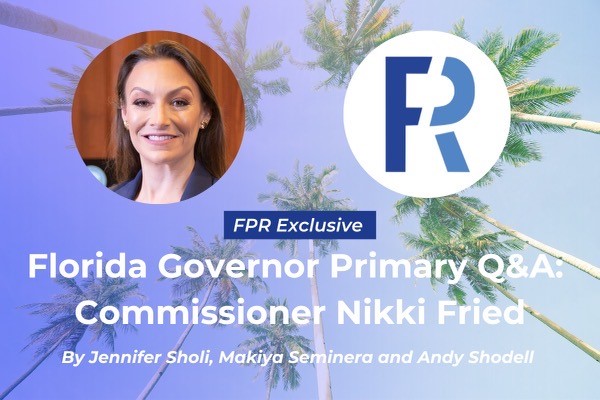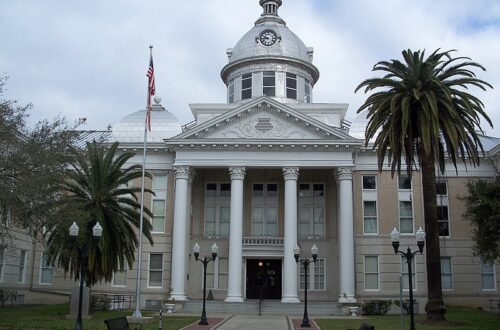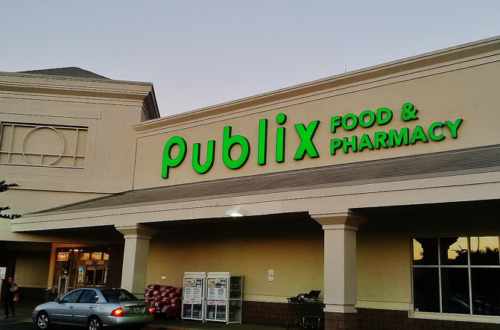The race for Florida governor is heating up as Commissioner Nikki Fried and Rep. Charlie Crist compete for the Democratic nomination to face Gov. Ron DeSantis. The Florida Political Review recently caught up with both candidates to gain insight into the race ahead of the Aug. 23 primary.
Nikki Fried began her career as a lawyer, finding her happiness as a public defender in North Central Florida. She then became a foreclosure defense lawyer before establishing her own lobbying firm, Igniting Florida, to advocate for medical marijuana and other industries across Florida. Elected as Florida’s Commissioner of Agriculture and Consumer Services in 2018, Fried became the first Democrat to win statewide in Florida since 2012. She is currently the only Democrat in the Florida Cabinet. Fried’s campaign website is https://nikkifried.com/.
Fried answers questions about her background, reasons for running, opponents, important issues, book recommendations and her message for students.
Q: You’re the first woman to be elected Commissioner of Agriculture, the only statewide elected Democrat in Florida, and you’re also Jewish. What does it mean to you that you’ve made so much history, and have you had to be more aggressive when it comes to getting things done as a woman?
A: Yeah, actually the other glass ceiling that I broke at the University of Florida was to be the first female elected student body president in almost two decades. I take it very seriously that I’m breaking through a lot of glass ceilings and showing other women and young ladies and girls that anything is possible. But I also talk very clearly about the fact that sometimes us women have to work a little bit harder — we need to show up earlier and stay later because there is not equality yet. I do take these positions seriously and whenever I have an opportunity to embrace a young girl on the campaign trail, to show her what strength looks like, I want to show her to just follow your dreams because anything is possible.
Q: More generally, why are you running for governor?
A: Something I was taught at a very young age growing up in Miami was what we call tikkun olam in the Jewish religion, which means to heal the world. So every aspect of what I have done my whole life is giving back, whether it’s my time at the University of Florida, to my time at the public defender’s office in Alachua County, to fighting for my clients, to fighting for homeowners during the foreclosure crisis, to my time now as Commissioner of Agriculture, I have been somebody who has always wanted to give back and to do good.
After three and a half years of watching up close and personal the destruction of what Ron DeSantis has done to our state — the divisiveness, the hatred, creating two Floridas here in our state, one for the billionaires and one for everybody else — I just couldn’t sit back and watch. So I’ve stood up, I have fought against it, and that’s why I’m running for governor. To make sure that we have somebody in the governor’s office who is going to lift up voices, who is going to reduce our cost of living, increase our standards and make sure that everybody’s got a seat at the table.
Q: Why are you more qualified than Charlie Crist to be the Democratic nominee for governor?
A: First and foremost, Democrats right now want two things. One, they want somebody who has a proven track record of winning. As the only Democrat who’s been able to win our state since Barack Obama in 2012, I’ve shown that I can win our state as a Democrat.
Two, Democrats want a fierce fighter, somebody who is able to get into the trenches and not only throw punches but land them and protect our rights. Right now, we are in a society, a state and country where democracy is literally falling through our hands and slipping away from so many people’s opportunities, whether it is the rights to vote and rights to protest, academic freedom that we’re seeing not just through the K-12 system but even higher education. I have been there fighting every single day for the people of our state.
That is not going to be the same thing for my opponent. You have somebody who has been a Republican, an independent, a Democrat. The only thing that Charlie’s ever fought for is his career. It is so essential that we have a candidate from the Democratic Party who is going to fight for our ideals and stand up for the people of our state.
Q: Ron DeSantis is a 2024 potential presidential contender and he’s widely popular among Republicans. Why are you more qualified than Ron DeSantis to be governor?
A: Ron has spent the last three and a half years radicalizing our state, polarizing our state, he played politics with the pandemic, and he has spent the last three years focusing on one thing and one thing only: running for president of the United States on the backs of Floridians. The people of our state deserve somebody who’s going to show up for them, who regardless of their party affiliation will have somebody who’s going to be there to fight for them and to make sure that we’re not dividing and creating this hatred.
Ron has spent his time fighting with every demographic of our state whether you’re Black, whether you’re a member of the LGBTQ+ community, whether you’re a female. Now, we’re passing a 15-week abortion ban, going after our teachers and going after our professors. That is not leadership. That’s failed leadership. I am ready for that fight and I’m the only person who can get in here and take him down.
Issues
Q: Let’s say that the election is over and you’ve won. What are the first three things you’re going to do when you take office and why?
A: First thing is what I’ve been hearing all across our state. We have to declare a housing emergency because that’s what it is. Day one, that executive order will already have been typed up so one of the things I do right after being sworn in is sign that executive order that allows me the opportunity to start going after predatory landlords because this isn’t inflation, this is greed. We’ve got to make sure that we’re holding them accountable. We also need to make sure that we are building more affordable homes by giving me access to all of the $20 billion that is in our reserves, working through ways to make sure that we are looking at opportunities to work with our local governments.
Number two, we also need to be declaring an emergency on women’s reproductive health care. That way, every single woman who’s in our state who needs access to reproductive rights and needs access to safe abortions makes sure that they are safe, that they’re not going to be prosecuted, and that their doctors are not going to be prosecuted. That’s number one and that’s number two.
Number three, we’ve got to be expanding Medicaid. That is also a failure that has happened here in the state of Florida, so we need to be crisscrossing our state, talking to our red areas, talking to our rural areas, and persuading our elected officials in Tallahassee that this is the right thing to be doing for the people of our state.
Q: You grew up with a Republican father and a Democratic mother. You are also Agriculture Commissioner in a fully Republican state government. What has that taught you about working with people you disagree with for the greater good?
A: Yes, my dad thinks that he has taught me well how to do a good debate! So what I was taught growing up was that you listen to both sides of a conversation, of an argument, and you figure out that there are more things that are always going to unite us than divide us, and to find that common ground that you can work off of. That’s what I’ve done not only my entire career, but also as your Commissioner of Agriculture, as the only statewide elected Democrat in a cabinet of three other Republicans, and a legislature that is predominantly Republican.
We have been able to get a significant amount accomplished. Seventy-five percent to 85% of my budget proposals went through the legislature, creating the first ever hemp program here in the state that has been able to create over 12,000 jobs, $380 million in economic impact, 25,000 acres under grow and to give alternatives to our farmers. That was about leadership — that was about talking to people across the aisle to say, ‘Look, there are things that we can do together that are going to work for the betterment of our state,’ and we got a lot of things accomplished.
Q: How do you think Florida students will be impacted by the Republican censorship of educational materials, and the legislation commonly referred to as ‘Don’t Say Gay?’
A: First looking at higher [education], I’m scared. I’m scared to see what is going on in our schools right now that we are in a time when the governor has taken away academic freedom. I remember back in school that if you didn’t like a class and you didn’t like a professor, you dropped them. Now, you’re seeing a situation where you’re asking your students and your professors their political affiliation and their ideology. What that does is it stifles conversation and stifles debate. How you make sure that you have a well-rounded citizenry is to make sure that your students are coming out of higher ed systems with information from all sides of a conversation so they can make judgment decisions of how they move their state forward and how they move their profession forward.
That’s a really big concern, and my bigger concern is that where Ron DeSantis wants to actually go from here is that he was working on proposing legislation this past session that actually takes power away from our university presidents and puts it into our boards of trustees. I was a past trustee when I was a student body president, and granted, all the individuals on the board that year were appointed by Republicans besides the student trustee as well as the chair of our faculty senate. Outside of that, every single trustee in the state of Florida for every one of our colleges and universities has been appointed by a Republican governor. To take away that balance that our university presidents need when they’re hiring professors as they offer tenure positions and make sure there’s diversity on campus shows that this is one more step to creating an authoritarian regime here in the state of Florida.
The same thing is happening in our K-12 system. I’ve talked to so many of our teachers across the state who have unfortunately gone through this new education civics course of what we are able to teach in our schools, what we’re able to say and don’t say, and unfortunately, you’ll see a population coming out of our school system that isn’t diverse, and unfortunately, we’re going to see a lot of kids be hurt, and unfortunately, we can end up seeing suicide rates increase in our LGBTQ-plus communities.
Growing up, my stepbrother came out to me when I was in high school, and I became entrenched in protecting him and protecting gay rights. This has been something that I have been fighting for my whole life. I can’t imagine if he didn’t have me, where he could have been today if he didn’t have a safe environment of people to go talk to. And that’s a concern. It’s not even just the students. I’m talking to teachers who are in same sex marriages and they can’t put up their pictures of their spouses in their classrooms. What message is it telling to a good chunk of the population of our state that they’re not accepted, that they’re not welcomed, that there’s something wrong with them? We need to make sure that we’ve got a governor who is going to reverse course on this piece of legislation, reverse course on what is happening in our schools, and make sure that we’re truly creating an environment where people feel safe — truly an educational environment. They should be more concerned about a pop up quiz than pictures they draw of their two moms they may have when they go home.
Q: Florida is a battleground for abortion right now with a synagogue suing the state’s 15-week ban, and Florida has been shown recently to be the most pro-choice state in the South. What role do you think abortion is going to play in the primaries and general election?
A: Significant. This is going to be one of those issues where we’ve already seen the polls change. We’ve already seen where the excitement on the ground is, looking at who your governor and your legislators are. We are mobilizing our base and we are mobilizing not just Democrats — I speak to Republican women all the time who say, ‘I may be pro-life, but this is not what we wanted.’ In this primary, this is going to be one of those dividing issues because Charlie Crist has been all over the place on this issue. In fact, when he was running back as either attorney general or governor of our state, he was supporting almost an all-out ban on abortions. He campaigned on being pro-life. He still to this day calls himself pro-life. This is not a time when we can question what actions he’s going to take if he happens to be in the governor’s office. We need true champions, true leaders, somebody who’s going to fight and stand up for a woman’s right to choose. I am in complete agreement with that synagogue’s lawsuit as also a member of the Jewish community. We are taught that life begins at breath, and beforehand, that fetus is part of the female body. Why should somebody else who has a different religious belief tell me how to believe in how to operate my body?
The same thing on the general election: 67% of Floridians did not want Roe overturned. They did not want this 15-week abortion ban with no exceptions for rape or incest. When the decision came down to overturn Roe, Ron DeSantis was celebrating saying that these are great times and millions upon millions of people across our state and across our country are happy about this decision, and that he wants to take it a step further.
This one issue shows the differences between myself and Charlie, and certainly myself and Ron DeSantis.
Q: Why are you suing the Biden administration about marijuana access and gun rights?
A: When I ran in 2018, I made a promise to the people of our state that I was going to defend and protect our medical marijuana patients and make sure that they got access to this medicine that we all voted for. I’ve also been in the trenches for years and years beforehand trying to get to legalization in Washington, DC. Unfortunately, so many of our medical marijuana patients here in the state of Florida, which is in our Constitution, are still discriminated against whether it is on housing, employment or that our veterans can’t get access to their VA benefits.
The other issue is that as a medical marijuana patient myself — and I’ve been very open and vocal about this, and also as a single female — I can’t go and purchase a gun. This is something that is really not only important to medical marijuana patients, but is also part of the bigger conversation of how we get to legalization in Washington, DC. The issue deals with the fact that on the ATF form, it specifically states that you cannot purchase a gun if you happen to be a medical marijuana patient. This is not something that just started under the Biden administration — this has been going on for years upon years upon years. So we felt that utilizing the power underneath the Department of Agriculture to sue the Department of Justice and ATF was one of those tools that we had to finally get to legalization and to protect our medical marijuana patients.
Q: If you could choose one book for everyone in Florida’s government to read, what would it be?
A: One book? Oh, wow, there’s a few… One is my Race Manners book. Race Manners was one of the classes I took at UF in race and race relations, and talked through ways to understand diversity, to put yourself in somebody else’s shoes and to truly understand what it means to protect people.
The second is actually a newer book and that was by my friend, Fred Guttenberg, who unfortunately lost his daughter in Parkland at the Marjory Stoneman Douglas shooting. He has a book that he wrote called Find the Helpers. This is a book where he went through his journey during healing, finding out devastating information about the loss of his daughter, and it says that you never know when somebody’s having a good or bad day. So people should alway be doing good things because you never know where your helpers come from. He even mentions me in the book when we got to meet in 2018 and didn’t realize what an influence we would be on each other’s lives. Those are two books that really humanize compassion on both fronts.
Q: What is your message for Florida students?
A: It is so important that we are engaging our younger generation because it’s you why we’re doing this. It’s making sure that we are protecting our environment, that we’ve got a good education system, that we have an economy that works for you, and that when you graduate, you have a good paying job where you can afford your house. Everything that we do, as elected officials, should be looking towards the next generation and making sure that we are empowering you all by giving you the tools to succeed.
So much of who I am today is because of my time at the University of Florida. Having gone through my undergrad, my masters, my law degree, my time in student government and the leadership skills I got, I have no doubt in my mind that if I hadn’t gone to the University of Florida and had those friends and experiences, I would not be Commissioner of Agriculture today and running for governor of the state. It was actually Lawton Chiles who used to say that it is harder to become president of the student body of the University of Florida than it is to run for governor, so I am testing his theory in person. So we really need everybody voting. We need people energized and excited about the primary because we’re gonna need everybody to protect our democracy come November and make sure that Ron DeSantis is a one-term governor.
By Jennifer Sholi, Makiya Seminera and Andy Shodell
Check out other recent articles from the Florida Political Review here.
Featured image: Florida Political Review candidate Q&A graphic depicting Commissioner Nikki Fried. Image by Maria Varas.





